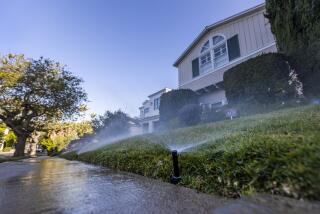Cashing In on Drought : Retailing: Companies offering products that conserve water are enjoying a surge in business.
- Share via
At Clark’s West Valley Plumbing, the telephone is seldom quiet these days as worried water users seek professional help.
“We’ve gotten a lot of calls the last three weeks” to fix leaks, install low-flush toilets and put in circulation pumps that speed hot water to the bathroom, said owner Bob Brunald. “When Mayor Bradley says it’s a crunch situation and they’re talking about the worst drought in years, people have become tuned into that, and they’re afraid they will be penalized.”
The scene is the same at Mini Flush Co., which sells a device that cuts the amount of water needed to flush a toilet. Introduced in late 1989 by inventor Charles Stevens, the $19.95 Mini Flush System brought $225,000 to the Yorba Linda-based company in 1990, said Chief Executive Gary Higgins.
“We’ll do that much this month,” Higgins said. “We’re a small company, but we’re getting big a lot faster.”
After five parched years, no one will dispute that California’s drought is a bad thing. It disrupts lives, destroys livelihoods, drives up business costs and casts a brown pall on the landscape.
But for some selected businesses, the drought and attendant water rationing have become something of a precious bane. As with any big statewide event, there will be people who--however apologetically--will make money off this dry spell.
Not surprisingly, the lucky few generally are businesses that have something to do with water: They help you save it, recycle it or offer a way to use their water instead of yours. For some--coin-operated laundries and car washes, among them--the hike in business could create problems if more customers lead to much higher water usage and penalties for exceeding water allotments.
“We’re kind of afraid of that,” said Ruby Kong, executive director of the Golden State Coin Laundry Assn.
Kong has seen business jump 25% the past month at her coin-operated laundry in Oakland, where water rationing has gotten a head start on most of Southern California.
“People don’t want to use their water because they’re rationed,” she said. “Hopefully, people won’t go crazy with it, because if they do we’ll probably have to close one or two days a week” to avoid penalties for exceeding the laundry’s water allotment.
Water saving is nothing new for Interbath, a City of Industry-based maker of low-flow shower systems, and Price Pfister, the Pacoima company with the slogan “the pfabulous pfaucet with the pfunny name.” The two have been manufacturing water-saving shower heads and faucets since the state mandated them in the late ‘70s.
Even so, “it’s going to be a good year,” said Claus Zieger, president of Interbath. “Business is up in water-saving products.”
U.S. sales of Interbath’s water-saving shower heads jumped nearly 50% the past year.
“We came up with a water-saver logo in the ‘70s which we kept after the drought ended, and we were told, ‘Why are you doing this still? No one cares.’ Now they’re saying it isn’t large enough,” Zieger said.
Doug Martinez, marketing director at Price Pfister, figures that the drought has to get worse to really affect business. “I just don’t think people are that motivated,” he said.
The four Snyder-Diamond plumbing and appliance stores in Los Angeles have sold “thousands” of low-flush toilets as well as other water-saving devices. But Walter Diamond, who founded the Santa Monica-based company 42 years ago with partner Louis Snyder, thinks the code-mandated commodes have actually hurt business.
Toilet manufacturers have yet to sell a “really stylish” low-flush model, so the relatively low-cost models available are diverting business from the ritzy toilets Snyder-Diamond stocks, he said.
“We have toilets that look like they came out of a palace. We could sell a toilet for $2,000,” Diamond said, noting that some affluent customers are installing low-flush toilets to pass inspection, then are replacing them.
For some, the potential of increased business hasn’t yet turned into reality.
The Sacramento engineering firm of Psomas Associates is looking at water reclamation and well-digging projects as a possible growth area, said project director Mike Thalhamer.
“The potential is there,” Thalhamer said. “But in these times when you need new facilities, (municipalities) don’t always have the money to pay for them” because many have been limiting the number of new water customers they will accept, thus reducing revenues.
The drought has been very good to Robert T. Kreiman, who has been selling a water-recycling system for photo processing equipment since 1979. Suddenly, customers he has been courting for years are demanding appointments to see the system, which costs between $20,000 and $120,000 and also recovers silver from the used photo wash water.
“We couldn’t be in a better position,” said Kreiman, president of Pace International.
More to Read
Inside the business of entertainment
The Wide Shot brings you news, analysis and insights on everything from streaming wars to production — and what it all means for the future.
You may occasionally receive promotional content from the Los Angeles Times.










